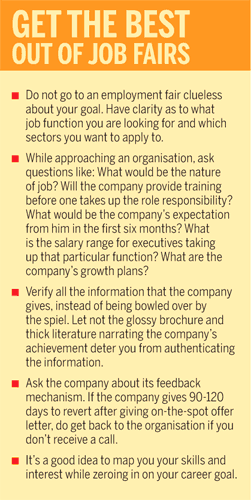 | « Back to article | Print this article |
How fair are job fairs?
A media conglomerate recently concluded the eighth edition of its job fair. Brandishing it as a grand success it pompously said, "We would have created six to ten thousand jobs over three days." Though exciting, it can't get more misleading than this. By using 'would', the media giant itself raises questions on the veracity of the figure it mentions. Upon validation, these numbers are bound to fall flat on its face.
For all practical purposes, how much steam does a job fair hold these days?
One cannot but wonder!It's a concept of boom times when mass recruitments were being done by companies growing at a hectic pace. The idea was to attract fresh talent for spothirings.
However, of late the nature of job fairs have undergone a major shift. Such fairs now merely serve as a platform for branding and image building exercise for companies. "It is no longer a career and employment fair," say HR experts. On-the-spot hiring activities have taken a backseat.
At best, candidates drop their resumes at various stalls and wait for interviewcalls. And companies rue that they don't get quality talent.
Careers360, is a complete career magazine
Moot question
The question is why would a talented resource go to a job fair at all? A traditional or an online medium of recruitment would easily fetch her/him a job. So, then why are big companies even participating in the fairs knowing well that a quality candidate is hard to come by?
"It's a cost-effective way for companies to get candidates," reasons M.S Shivakumar, principal consultant, ExpertusHR.
The conversion rate, from submitting the resume to getting the job, is dismally low. The Korean Embassy, which participated recently in a job fair, received more than 1,000 CVs. "Out of which we hired one person in the New Delhi office of Daewoo International Ltd., a global trading company," apprises Jaya Nayar, business manager, New Delhi Korea Trade Center, Korean Embassy.
While job fairs may still hold a charm in small cities, they are definitely losing their sheen in metros. Last year, the above mentioned media conglomerate had about 100 companies participating in the job fair held at Pragati Maidan but saw only 35 firms this year, confirms an industry source. HR experts strongly feel that job fairs are outmoded.
All that jazz
The question is not as much about quality of the candidates as it is about unpreparedness of the candidate.
Most job-applicants, fresh out of college, are starry-eyed and easily impressed by jazzy stalls and glitzy brochures of the companies. The information doled out by the companies is taken at face value. No questions are asked and no information verified.
Either the job-seekers are intimidated or are too shy to extract the requisite information.
Companies on the other hand, feel that while they get bundles of resumes, most of them don't fit the profile. Says Shivakumar, "Companies look to assess quantitative, analytical and verbal skills of a candidate and the candidate has only a minute to impress the recruiter."
The disappointment comes when this connect fails to happen.
Prepare some more
Most jobseekers actually have no clear idea about their job description, feels Shivakumar.
The sentiment is also endorsed by Sunil Kalra, a job consultant from a leading HR firm. Candidates should have clarity about their goal, he says. Before approaching a recruiter, decide depending upon your academic background, knowledge, skill and interest, the sectors and role functions you would like to go in for.
Don't feel shy to ask questions and find answers to your queries from the prospective recruiter. "If the job seeker has clarity about his goal then achieving it is a natural process, as he will definitely work towards realising it," says Kalra.
Before attending the fairs, it's a good idea to evaluate your skill-sets by either taking online skill assessment tests or visiting a career counsellor who will evaluate the skills and provide you with a set of job options.



